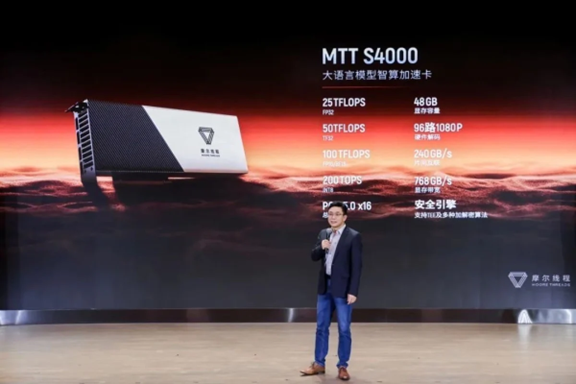Despite being blacklisted by the US, Beijing-based chip start-up Moore Threads has unveiled an AI AIB and computing hub as part of its KUAE Intelligent Computing Center. The initiative aims to address China’s growing demand for large language model training. Moore Threads has emphasized a commitment to GPU development despite facing challenges in securing wafer foundries and recent layoffs. The company, a key player in China’s chip self-sufficiency efforts, has not disclosed the foundry for its GPUs but emphasized compatibility with Nvidia’s CUDA technology. Moore Threads claims its computing center can train a 130 billion-parameter model within 56 days.

What do we think? Moore Threads may not be able to get access to the leading fabs like Intel, Samsung, and TSMC, but it can probably get wafers from the second-tier fabs like Global Foundry and produce GPUs that would be comparable to Nvidia’s Ampere series. CEO Jams Zhang Jianzhong may have to lower his estimate of how many parameter models can be processed in how many days, but it could still be impressive.
Moore Threads Intelligent Technology, a Beijing-based GPU start-up facing US trade sanctions, unveiled a new AIB and introduced what it claims is China’s first GPU-based computing hub for AI training. The company, focused on designing GPUs tailored for AI training, aims to address China’s increasing demand for large language model training through its KUAE Intelligent Computing Center. Moore Threads CEO Jams Zhang Jianzhong emphasized the company’s comprehensive computing product line, spanning from chips to AIBs and clusters, leveraging the multifunctional advantages of GPUs. The announcement comes as Moore Threads and Biren Technology, both prominent Chinese AI chip start-ups, were added to the US Entity List in October, restricting their access to wafer foundries and electronic design automation software.
The US sanctions have presented challenges for Moore Threads and Biren Technology in securing wafer foundries willing to manufacture their chips, paralleling the difficulties faced by Huawei Technologies since late 2020. These export restrictions have also impacted the companies’ access to essential US electronic design automation software. In response to the sanctions, Moore Threads recently announced layoffs, with CEO Jams Zhang Jianzhong describing them as a difficult but necessary decision to consolidate resources and emphasize GPU development. Despite the setbacks, Moore Threads remains a key player in China’s push for chip self-sufficiency, having raised substantial funding and forming partnerships to drive its GPU-focused initiatives.
Based on that push in China for chip self-sufficiency, Moore Threads gained significant investor interest, raising a total of $525.7 million as of December 2022. This included $205.4 million from a Series B funding round, leading to a pre-market valuation of ¥28.95 billion ($4 billion US). The company, a key player in China’s chip self-reliance efforts, did not disclose the foundry for its latest graphics cards but highlighted the quick construction of its KUAE computing facility and claiming compatibility with Nvidia’s CUDA. Moore Threads claims its center can train a 130 billion-parameter model within 56 days.
In the face of updated US export controls, Nvidia is now prohibited from selling its A800 and H800 chips to Chinese companies. This restriction, coupled with the growing interest in large language models, has turned Nvidia GPUs into sought-after commodities for Chinese tech giants like Baidu, ByteDance, Tencent, and Alibaba. Analysts believe these export curbs could impact China’s AI development. Data from research firm Omdia suggests that these firms are anticipated to purchase 125,000 Nvidia H100 GPUs in 2023, constituting 20% of all H100 shipments. Even non-tech Chinese companies, including a landscape designer and a powdered flavor maker, have highlighted their use of Nvidia processors.